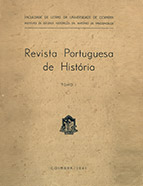

................................
Tome III of the RPH, published in 1947 in a context of euphoria at the end of the Second World War, seemed to indicate a broadening of themes, particularly in the Miscellany, which included four articles on economic history: two by Virgínia Rau and two by Julião Soares de Azevedo. The most expressive indicator that the new directions that French historiography had been taking since 1929 were arriving in Coimbra at that time is shown in the emotional and very informed text on the personality and work of Marc Bloch that Torquato de Sousa Soares, "a spirit open to new historiographical currents" (António de Oliveira), wrote for the aforementioned volume, from which the following extracts are transcribed: "Assassinated on 16 June 1944 by an implacable enemy who did not know how to respect his situation as a prisoner, Marc Bloch, who was 58 at the time, left behind a work which, without being extraordinarily extensive, opens up new perspectives for History like a sudden flash, replacing the old concept of the science of the past with that of science of man or rather of men —of men in time—a science which does not break man down into separate roles, but which takes him entirely into itself." Referring to the book Apologie pour l'histoire ou Métier d'historien, he describes it as a "concise study of historical methodology", reflecting the historian's vision. It is characterised as "largely a work programme for young historians" and an expression of "a man who experiences history not as an antiquarian content with what has aged and concluded, but as a true historian whose essential quality is the grasp of what is alive and continues to endure as such." In a text of 20 pages, Torquato de Sousa Soares reviewed Marc Bloch's entire historiographical work in as much detail as possible, considering that the journal Annales de histoire économique et sociale, run in partnership with Lucien Febvre, expresses "the essence of his intellectual activity". Particularly interested in questions of methodology, Torquato de Sousa Soares promised to write "in one of the next tomes of the Revista Portuguesa de História" a critical appraisal of the work Apologie pour l'histoire ou Métier d'historien, published posthumously by Lucien Febvre, based on his selection of the manuscripts written by the late historian during his imprisonment. Torquato Sousa Soares didn't, or couldn't, fulfil his promise to publish a critical review of the work that was to be translated into Portuguese in 1965 under the title Introdução à História [Introduction to History]. We only learnt that he regarded it a "work so rich in ideas and suggestions".
This work is financed by national funds through FCT - Foundation for Science and Technology, I.P, in the scope of the projects UIDB/04311/2020 and UIDP/04311/2020.
